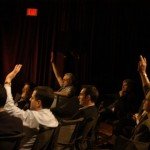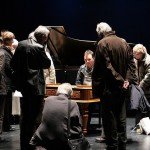ICMPC 12 Day 2: Afternoon talks
The afternoon of the second full day at ICMPC saw a session entitled ‘Listener Perspectives’ chaired by Alex Lamont. The session featured two talks, one from John Sloboda and Melissa Dobson (sadly Mel was not here) and one from Amanda Krause who is working with Adrian North. Both talks shed new light on the world of the music listener, the first from the concert perspective and the second from the everyday music user.
 John is, as you can imagine, is an extremely experienced presenter and as usual both his diction and tone did not disappoint. It is a very relaxing feeling to be in the presence of such control and I hope one day I can sound half so wise.
John is, as you can imagine, is an extremely experienced presenter and as usual both his diction and tone did not disappoint. It is a very relaxing feeling to be in the presence of such control and I hope one day I can sound half so wise.
John and Mel have been working on a unique project within the Guildhall School of Music. They are hoping to establish a new method for studying audience experiences in the concert setting. John outlined what he called the current ‘dominant approach’, typified by a fundamental lack of collaboration between musicians and the music perception researchers. In the dominant approach there is more of a focus on a lab-like environment that is overly controlled and where the researcher drives the format of the design.
 In their new approach John and Mel seek to break these barriers and to increase immediate feedback for the artist (instead of making them wait months for the publication of a paper). The artists (composers, performers, directors etc) are also fully consulted as part of the experimental design. They have a role in shaping the interview questions that are given to the audience in a post concert discussion and are able to shape the post performance discussions. The aim is to pose artistically relevant questions that also glean insight into the experience of an audience – so hopefully, everybody wins!
In their new approach John and Mel seek to break these barriers and to increase immediate feedback for the artist (instead of making them wait months for the publication of a paper). The artists (composers, performers, directors etc) are also fully consulted as part of the experimental design. They have a role in shaping the interview questions that are given to the audience in a post concert discussion and are able to shape the post performance discussions. The aim is to pose artistically relevant questions that also glean insight into the experience of an audience – so hopefully, everybody wins!
What John and Mel seem to be building is a more integrated approach to concert-going. As a consequence I am not sure how well their data reflects the average concert experience since the research itself becomes very much a part of the performance in their studies. People are given questions to think about during the performance and/or are aware that there will be a discussion with the artists after the performance in the presence of the researchers. Whilst this approach sacrifices control and the ecological validity of the situation it has produced a new kind of concert going experience; one that was valued by performers, composers and the audience.
At the end of the day an audience member does not have to get involved with the research if they would prefer to remain a passive listener. So nothing is lost from an audience perspective – there is now simply another level by which they might engage with and appreciate the performance.
John detailed the findings from two different events; the premier of a new music piece by a student at the conservatoire and the performance of a theatrical operetta.
 In the first event the audience were given a 4 item questionnaire, devised by the composer. They were also invited to a post concert discussion (9/27 attended). The primary finding was that the questionnaire approach stimulated the attentiveness of the audience, especially to the themes within the composition – to the clear delight of the composer.
In the first event the audience were given a 4 item questionnaire, devised by the composer. They were also invited to a post concert discussion (9/27 attended). The primary finding was that the questionnaire approach stimulated the attentiveness of the audience, especially to the themes within the composition – to the clear delight of the composer.
In the second event 50% of the audience joined a post-concert discussion. The creative team (mostly the performers and directors, with a researcher liaison) devised the questions. One interesting finding from the artists was that this process of devising the questionnaire helped to sharpen the rehearsal process and reduced the disparity between the audience and the artists. This was viewed as a positive step by the artists but one that induced a level of new anxiety during the performance.
 Overall, John and Mel’s research has created a process by which an audience member might transition from a passive recipient of sound to a consultant in the artistic process. I found this a very refreshing approach which may have limitations in assessing music perception but has stimulated a new level of music appreciation.
Overall, John and Mel’s research has created a process by which an audience member might transition from a passive recipient of sound to a consultant in the artistic process. I found this a very refreshing approach which may have limitations in assessing music perception but has stimulated a new level of music appreciation.
The second speaker was Amanda Krause who is interested in the impact of new technologies, more active listening (stimulated by more choice and more control) and an increase in the number of ways in which we may use music in everyday life. What is the impact of this change in our music listening options and how does our everyday use compare to that measured around 10 years ago?
 Ten years ago North, Hargreaves and Hargreaves (2004) were collecting data for their paper on everyday music uses. They speculated that music listening had become more widespread but more passive with the introduction of music technology; that music was creeping into the background of our lives from its previous position as a focus for our attention.
Ten years ago North, Hargreaves and Hargreaves (2004) were collecting data for their paper on everyday music uses. They speculated that music listening had become more widespread but more passive with the introduction of music technology; that music was creeping into the background of our lives from its previous position as a focus for our attention.
Amanda utilised their method, experiential sampling (ESM), to determine whether this conclusion was still valid 10 years on. Over the course of 7 days she sent 2 texts per day at random times to 370 people. 177 completed at least 12 of the 14 responses so their data were included in the results.
At the time of the text participants were asked to complete and ESM online response which asked whether they had heard music in the previous 2 hours. If they had then the participant was asked a series of questions about this music, such as the context, their response, and their engagement with the music.
 The results indicated three main types of everyday music listening; purposive, actively engaged and validation seeking. Overall, music devices that offered the most control (e.g. cloud services, MP3s) showed the strongest correlations with response effects and mood. She concluded that choice and control are extremely important in our response to music and that rather than being a passive component, music is being utilised as an active resource in everyday life.
The results indicated three main types of everyday music listening; purposive, actively engaged and validation seeking. Overall, music devices that offered the most control (e.g. cloud services, MP3s) showed the strongest correlations with response effects and mood. She concluded that choice and control are extremely important in our response to music and that rather than being a passive component, music is being utilised as an active resource in everyday life.
The more we become aware of the effects of music the more potential there is to boost the life experience in many situations. A lovely positive message!
Please visit her site at www.researchaboutlistening.com for more details and for the opportunity to take part in her experiments on everyday listening.
2 Comments
Mark Riggle
Hi Vicky,
Thanks for blogging while suffering through a conference in Greece and thus letting the rest of us avoid that severe hardship! Good job giving the gist of the conference. Thanks. again.
If there was a conference CD (or flash drive) of the submitted papers (as in some past ICMPCs), do you know if it can be made available?
Mark
vicky
Hi Mark
There was a conference CD that was given to all the delegates and which contained all the papers/abstracts but I am not sure if it is generally available anywhere. My advice would be to contact the conference organisers.
Thanks for the kind words about the conference blog, it is really nice to hear that it was useful for others (for me it is a great way to consolidate my terrible memory!)
Best,
Vicky